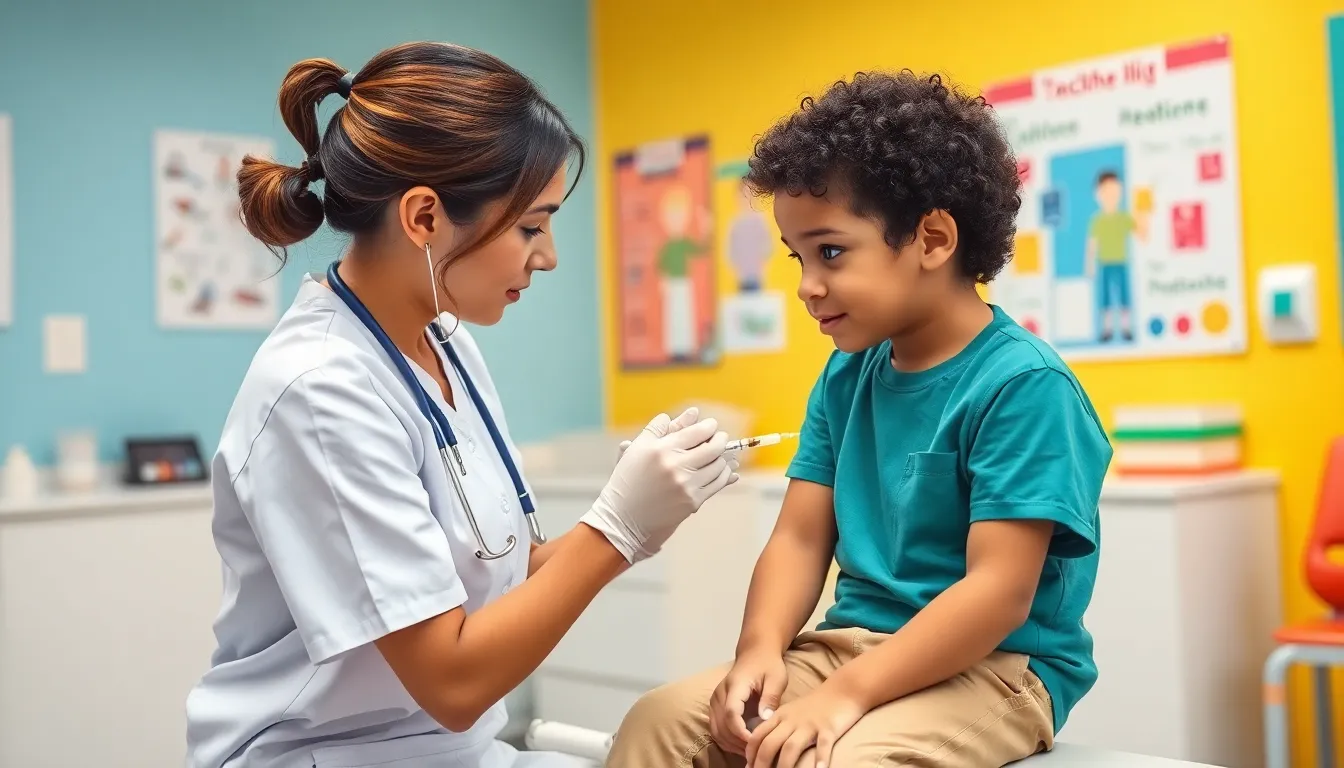In the bustling world of healthcare, pediatrics nurse practitioners stand out as the superheroes of child health. Armed with stethoscopes instead of capes, they tackle everything from sniffles to serious illnesses, all while keeping their tiny patients smiling. These professionals blend medical expertise with a knack for making kids feel at ease, turning daunting doctor visits into playful adventures.
Table of Contents
ToggleOverview of Pediatrics Nurse Practitioner
Pediatric nurse practitioners play a pivotal role in children’s health. They combine clinical expertise with compassionate care, addressing both routine and complex medical needs.
Definition and Role
A pediatric nurse practitioner (PNP) is an advanced practice registered nurse specializing in the care of infants, children, and adolescents. PNPs diagnose and treat various health issues, offering everything from physical assessments to preventive healthcare services. They also educate families about health management and provide emotional support during medical treatments. By collaborating with pediatricians, they enhance the overall efficiency of pediatric care. Most importantly, PNPs create a welcoming environment, making healthcare visits less daunting for young patients.
Educational Requirements
To become a pediatric nurse practitioner, individuals must first earn a Bachelor of Science in Nursing (BSN). After gaining clinical experience as a registered nurse, they pursue a Master of Science in Nursing (MSN) with a focus on pediatrics. Accreditation from a recognized program is crucial. Following their education, candidates must pass a national certification exam, which validates their expertise in pediatric care. Continuing education requirements also exist to maintain certification and stay updated with advancements in pediatric medicine.
Key Responsibilities
Pediatric nurse practitioners (PNPs) carry crucial responsibilities in ensuring children’s health and well-being. Their role encompasses various aspects of patient care and communication with families.
Patient Care
Patient care forms the core of a PNP’s duties. They assess children’s health, diagnosing illnesses and creating treatment plans tailored to individual needs. Managing both acute and chronic conditions, PNPs provide immunizations and perform routine screenings to maintain health. They educate young patients about healthy lifestyles, promoting preventive care. Each interaction aims to create a comfortable experience, addressing physical and emotional needs during assessments and treatments.
Communication with Families
Effective communication with families is vital in pediatric care. PNPs discuss diagnoses, treatment options, and progress updates with parents or guardians. They provide guidance on managing health conditions at home, offering advice for preventative measures. Listening to family concerns, PNPs build trust, ensuring parents feel involved in their child’s health journey. Clear explanations empower families to make informed decisions, fostering a collaborative approach to care. Engaging with families supports a holistic understanding of health, crucial for optimal outcomes in pediatric settings.
The Importance of Pediatrics Nurse Practitioners
Pediatric nurse practitioners (PNPs) play a crucial role in enhancing the health outcomes of children. These professionals provide vital services that positively influence child health.
Impact on Child Health
PNPs address a broad spectrum of health issues affecting children. They manage both minor and serious health concerns, ensuring timely interventions that promote well-being. Evidence indicates that children receiving care from PNPs experience higher satisfaction rates during medical visits. Their approach to care includes preventive measures such as vaccinations and health education. They effectively educate families about nutrition, exercise, and disease prevention. Studies show that preventive care significantly reduces hospital visits. These actions contribute to healthier childhood development and improved long-term health outcomes.
Collaboration with Healthcare Teams
Collaboration defines the practice of pediatric nurse practitioners. They work alongside pediatricians, nurses, and other healthcare professionals to create a seamless care experience. Through effective communication, PNPs share valuable insights about patient conditions and treatment plans. Joint efforts in managing patient care lead to comprehensive treatment strategies. Research supports that interdisciplinary collaboration enhances overall healthcare quality for children. PNPs also participate in community outreach programs, raising awareness about child health. Such initiatives foster partnerships that extend beyond clinical settings, ensuring resources reach families in need. These collaborative efforts ultimately strengthen the healthcare system dedicated to children’s health.
Challenges Faced by Pediatrics Nurse Practitioners
Pediatrics nurse practitioners encounter various challenges in their daily practice. These challenges can affect their efficiency and job satisfaction.
Job Stress and Burnout
Job stress and burnout represent significant issues for PNPs. Rapid patient turnover and emotional demands lead to high levels of stress. Providing care for sick children can take an emotional toll, impacting a PNP’s overall well-being. Moreover, long hours and heavy workloads contribute to fatigue, reducing job satisfaction. Fostering a supportive work environment plays a crucial role in mitigating stress. Implementing self-care strategies also helps PNPs manage burnout effectively. Engaging in professional development opportunities can enhance resilience and promote work-life balance.
Navigating Healthcare Policies
Navigating healthcare policies presents complexities for PNPs. Understanding regulations around insurance, reimbursement, and scope of practice remains essential for optimal patient care. Each state has its own laws governing PNP practices, which can limit clinical autonomy. Staying updated with policy changes requires ongoing education and training. Furthermore, advocating for legislative changes can empower PNPs and improve access to care. Collaboration with other healthcare professionals helps address policy challenges effectively. Connecting with professional organizations provides resources and support for navigating these hurdles.
Conclusion
Pediatric nurse practitioners play a crucial role in ensuring the health and well-being of children. Their blend of clinical expertise and compassionate care makes them invaluable in the pediatric healthcare landscape. By addressing a wide array of health issues and fostering open communication with families, PNPs not only enhance patient satisfaction but also promote healthier outcomes for children.
Despite facing challenges like job stress and complex healthcare policies, their commitment to ongoing education and collaboration with other healthcare professionals remains steadfast. As advocates for child health, PNPs continue to make significant contributions that resonate throughout communities, ultimately shaping a brighter future for the next generation.





